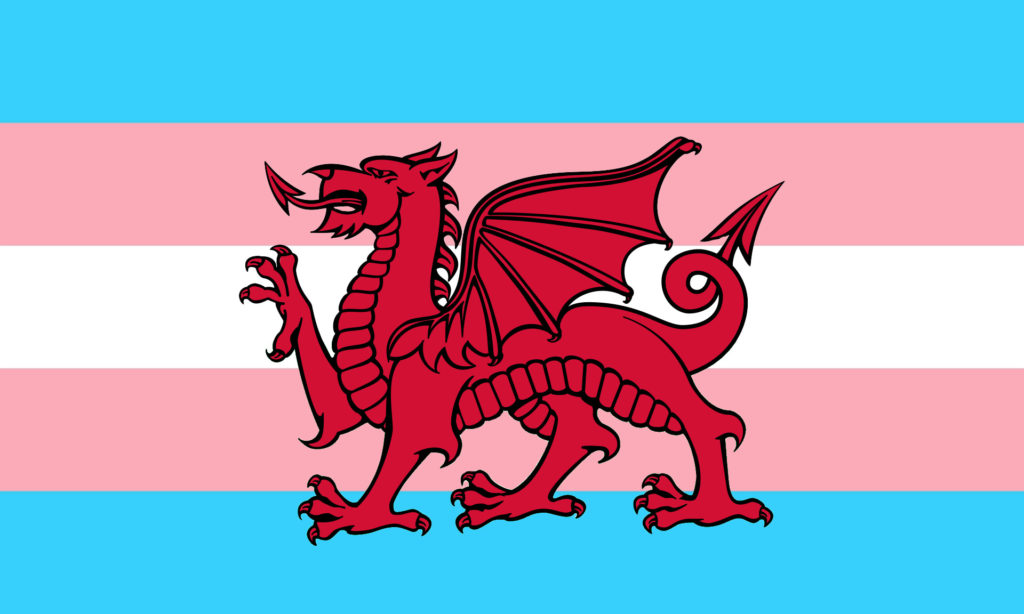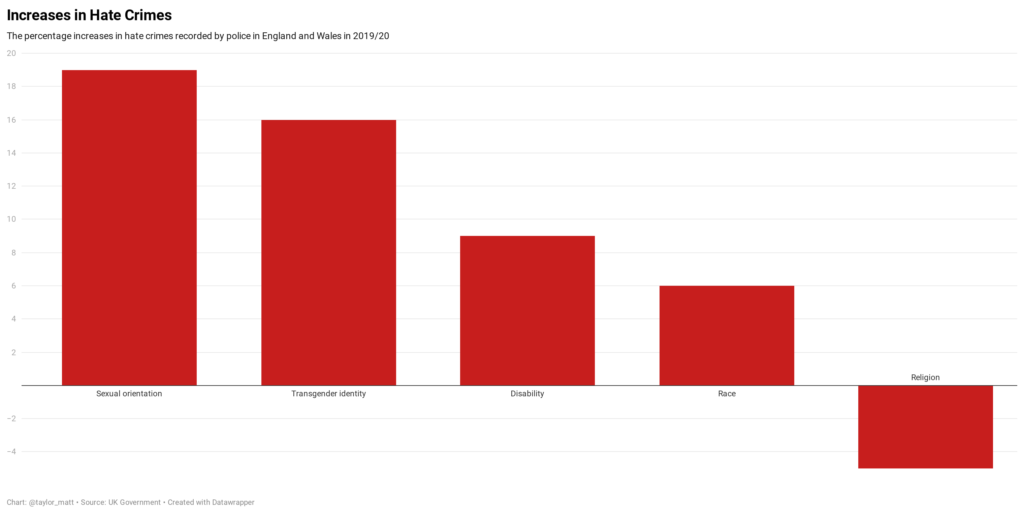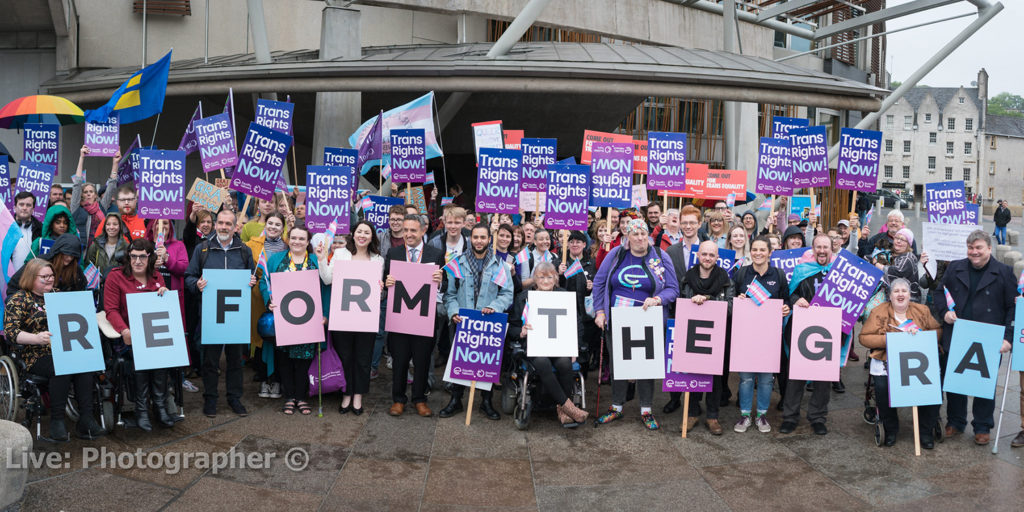The Welsh government says hate has no home in Wales – so why has there been an increase in the number of transphobic hate crimes in the past year?

In 2020, the UK is more divided than it has been in decades. As became evident this past summer, hatred is everywhere – and that hatred has resulted in increasing violence towards minority communities.
Research published by the UK government in October showed that there were over 105,000 hate crimes recorded by police services in England and Wales in 2019/20 (an increase of eight percent on the year before) – but this increase is not evenly distributed.
The report found that, while hate crimes as a whole only increased by eight percent, stats for the LGBTQ+ community show more than double this increase: hate crimes motivated by sexual orientation were up by nineteen percent, trans identity by sixteen percent. Hate crimes motivated by race and disability showed smaller increases, while religious hate crimes fell for the first time since 2013 – so why is the trans community so targeted?
A lack of education
Jessica Rees, Wales hate crime manager for Victim Support UK, believes this is down to a combination of factors. Chief among them, she says, is the way trans people are portrayed by the media. “It’s definitely being pushed by certain agendas,” she says, “such as [the rhetoric that] trans rights mean women’s right would be jeopardised, which just isn’t the case.”
“When media attention is given to people who want to self-identify as a penguin or whatever, that doesn’t help the cause of trans or non-binary people,” she adds. “It always comes back to the media and a general lack of education and awareness around what it is to be trans.”
That lack of education is something that Jessica, and many other allies, believe needs to be fixed. Education in schools, she says, “would be ideal,” but even without that she has noticed trends among allies. “It seems to be that millennials [and younger generations] are more accepting of different identities,” she points out, “so if we can keep that going then, hopefully, we can see some positive change in upcoming generations.”
Jessica is full of praise for the way the Welsh government has responded to hate crimes, but feels that the UK government in Westminster now needs to step in and make a bigger commitment to tackling the issue. Increased social media monitoring and police funding, she says, are the two best ways of reducing hate crime.
Cis people need to lead the way and stand up against transphobia
Jessica Rees, Victim Support Cymru
‘Advocacy, support and signposting’
Increased funding is certainly on the agenda for the Welsh government; since 2014, the government has provided funding for Victim Support Cymru to operate the National Hate Crime Report and Support Centre. In a statement, the government said this funding “has helped to create a reporting system across Wales which provides an initial point of contact for victims and provides advocacy, support and signposting.”
This is something that Jessica feels has been instrumental in showing the Welsh government’s commitment to tackling hate crime – a commitment which is set to continue into 2021 when the government launches new, educational anti-hate crime campaigns across Wales to increase awareness and reduce the issue of hate crimes.

South Wales Police, meanwhile, doubled down on its pledge to tackle hate crimes. Speaking on behalf of SWP, senior news and content officer Rhodri Kendall said, “We recognise the insidious and divisive nature of these types of crimes, so we remain vigilant and actively encourage victims to come forward to report their experiences.” According to Victim Support Cymru, many victims of hate crimes do not report them because of mistrust in the police system, but this was disputed by SWP.
“The accuracy and integrity of our crime recording has been recognised by the HMIC previously and we also take the recognition and recording of hate crime very seriously,” Officer Kendall went on to say, before promising to prosecute anyone who commits such “insensitive offences which cause both physical and mental harm.”
Everyday occurrences
Those “insensitive offences” can range from microaggressions (such as misgendering someone) to more serious physical or verbal assault.
Research published by Stonewall Cymru and YouGov in 2017 showed that over half of trans people surveyed (52 percent) had experienced a hate crime in the twelve months prior to the survey, while the same number admitted to avoiding certain streets where they live because of previously unsavoury experiences.
Discriminatory incidents can occur anywhere, as the Stonewall research shows: Sade says she was denied entry to a bar by a bouncer purely on account of her being trans, while Hannah was told she must use the male toilets of a nightclub by security. Jo reports being repeatedly misgendered in a clothing store, while Ari was “denied entry to male changing rooms in a store because the sales assistant decided [he] was female.”

These types of incidents, known as microaggressions, may seem small, but can be just as harmful as more severe incidences. Stonewall reports that almost one in four LGBTQ+ people surveyed were threatened with physical violence, while one in eight were physically assaulted. Research by Lee Broadstock details the story of one trans person who was verbally abused by passers-by, before being hit with a car by a nearby taxi driver.
Hate crimes such as these are far too common in the UK – but the next steps must be taken together in order to overcome transphobia. As Jessica says, “Cis people need to lead the way and stand up against transphobia.” Trans lives matter, and only by coming together can we fix our divided society and pave the way for a safer, more inclusive country that is truly united.
How to be a better ally to the trans community:
- Report hate speech when you see it: Anyone can report a hate crime, not just the victim. With more reporting, more awareness can be raised, and more work can be done
- Show trans folk you care: Hate crimes feel isolating to many people, so by letting someone know that you care about them, you can make them feel much less lonely
- Amplify positive trans role models: The representation of trans people in the media needs to change. The positive response to Elliot Page’s coming out shows a significant improvement, but things still have a long way to go
- Lobby for change to the Gender Recognition Act: The current GRA makes it extremely difficult for trans and non-binary people to express their gender in law. Charities such as Stonewall have campaigned for years to de-medicalise the GRA – changes were announced by the UK government in September 2020, but these were minimal, and the process remains highly medicalised
- Educate yourself: Without formal LGBTQ+ teaching in the UK, it’s down to the public to educate themselves on trans issues – with education and awareness, it becomes much easier to spot and stop hate crime
